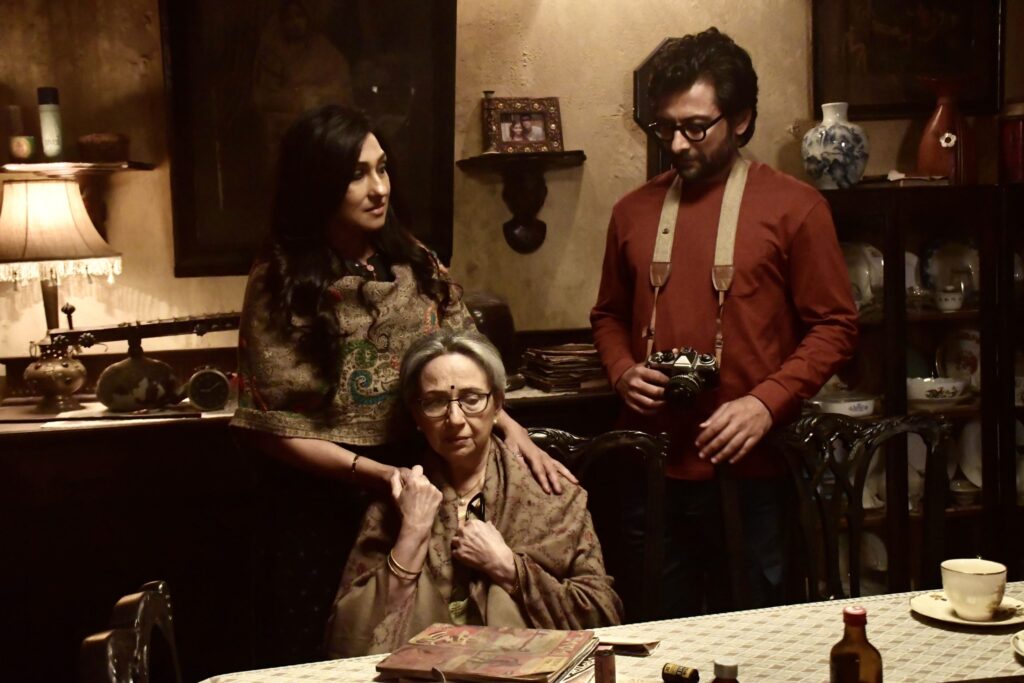Puratawn is arguably Suman Ghosh’s best film to date. The film marks the return of veteran actress Sharmila Tagore to Bengali cinema after fourteen years and explores her mental journey in which, being afraid of the future, she chooses to live in the past.
The film looks at Mrs Sen (Sharmila Tagore), who is about to turn eighty and who lives in an old house away from the noisy hubbub of Kolkata. The house reminds her of a past she is averse to distancing herself from or forgetting. But forget she does and therefore, she holds on to the things stocked in the neglected store room – old photographs, ancient letters, albums, musical instruments, etc, which the caretaking girl is scared to enter because of the insects that have made it their home. Rittika aka Mamoni (Rituparna Sengupta), Sen’s daughter and a successful businesswoman, steps into this dusty domain to find what is in there for her vacillating mother to be so attached to, and this trip becomes her journey to visit her past as well.
In Puratwan, the characters initially play a slightly secondary role to the environment and the old house, but they assume significance as the film rolls on. Mrs Sen tries to remain in her past, constantly singing her favourite Tagore song with the old harmonium as accompaniment, as her husband sits and watches quietly. Or, she begins to prepare tiffin for her little Mamoni before she leaves for school, while the grown Mamoni stands by and despondently watches her mother’s ‘deterioration’. We realise that the mother-daughter relationship has reversed itself quite organically, as it is up to Rittika now to nurture her mother. But even as Rittika is worried about her mother’s mental health, her psychiatrist friend, Gaurika (Ekavali Khanna), gives Mrs Sen a clean chit, while Rittika’s husband, Rajeev (Indraneil Sengupta), reminds her that her mother should be allowed her time and space to live as and where she wishes to.
In one small scene, Mrs Sen looks up at Rittika and asks her, “Who are you?” Her health issue appears as if it is the approach of Alzheimer’s, but it is not. What Mrs. Sen is suffering from is Futurophobia, an anticipatory anxiety or dreading the future characterized by a fear or worry about potential negative events. It can involve ruminating over worst-case scenarios, feeling tense or irritable, and experiencing other anxiety symptoms like increased heart rate or difficulty concentrating. It can involve ruminating over worst-case scenarios, feeling tense or irritable, and experiencing other anxiety symptoms as well.
A sub-plot narrates the love story of Ritika and Rajeev, an adventure photographer passionate about difficult, even life-threatening, geological tours. This track, exploring the growing relationship between Rittika and Rajeev, offers us an alternative glimpse into the world out there as the young pair climb mountains, discover little-known rocks, and take rest on the bank of a water body with Rittika resting her head on Rajeev’s shoulders. But once married, the marriage sees its ups and downs till it reaches the edge of a breakdown. Rajeev is also there in the ancient home to celebrate his ‘aunty’s’ 80th birthday, and seems to understand her predicament much more than Rittika does. He is emotionally distanced and therefore, more objective.
Sharmila Tagore triumphantly sheds all her starry, on-screen mannerisms and is quite simply, brilliant as she lives her role, never once striking a false note. Rituparna Sengupta, who has also produced the film, merges completely into Rittika and plays the perfect foil to Tagore. The much-ignored Inraneil Sengupta in Bengali cinema shines like a bright star with his wonderfully nuanced performance right through the film. Brishti Roy as the all-purpose housemaid is natural, while Ekavali Khanna gets to do a purposeful role as Rittika’s childhood friend-turned-psychiatrist.
Ravi Kiran Ayyagari lifts the film further with his evocative camerawork complemented by the fine-tuned editing by Aditya Vikram Sengupta, which seamlessly and smoothly journeys through the film. Alakananda Dasgupta’s music, enriched by the slow Tagore number sung in pieces by an unrecognizable Shreya Ghoshal, adds to the high aesthetic benchmarks set by Ghosh. Sabarni Das’ costumes are of a standard one naturally expects of a National Award-winning designer. Though the ancient relic-of-a-house is the central character in the film, it would never have become the film it is now without the tremendously innovative and creative contribution of Tanmoy Chakraborty as the production designer of the film.
Puratawn means ancient. Ideologically speaking, the film spells out that the ancient must never be equalized with outdatedness or the past. It is as much our present as it is our future because the foundations of our identities are laid in the ancient to shape what becomes of us in our future. This, the film brings out beautifully.
Bengali, Drama, Color


